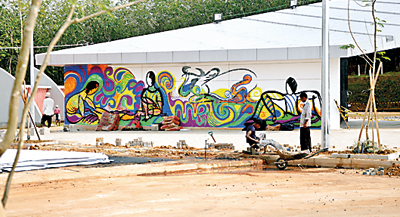Canowin Resort: Futuristic one stop on the highway
The long accustomed ritual on a trip down south was to watch the beautiful Indian Ocean as the Galle road meandered parallel to it. This was before the completion of the Southern Expressway, as the new-age Sri Lankan travel experience. Now, the highway that takes you past lush greenery and artistic rock faces has a new addition. Fast nearing completion at the halfway mark, is the state-of-the-art Canowin Highway Rest Stop.
Deriving the inspiration for its bent arch shape from the many curved bends encountered along the highway, the rest stop was designed on the ‘Ambalama’ concept with a futuristic twist.
The project was funded by the Sri Lanka Insurance Corporation while the task of coming up with an innovative design and structure was handled by ‘Prefer Associates (Pvt) Ltd’. “The initial idea was to have a rest stop for food and refreshments, but we decided that we had the potential to expand into other ventures,” says Managing Director Priyantha Fernando.
The highway rest is at the 43 km mark, and one might argue that it is too short a distance for a stop , but Mr. Fernando reiterates that this is not a short term initiative, and will serve a greater purpose when the whole highway network comes into play. “The highway will expand further, while it will be linked to the other highways that will come in a couple of years. A fully fledged approach is what we aspired for,” he adds.

An artist’s impression of the project
The team of young and inspired architects and managers Fatema Patel, Rasini Balasuriya, Yasasi Hettiarachchi and Shirin Hussain was never short of innovation, looking to infuse a free and modern spirit to the project. “What we wanted to do was something totally differentwhile keeping with the Sri Lankan identity,” says Rasini. The project stressed heavily on a sustainable approach, she adds.
The architects believe that it is the only rest stop in Asia equipped with the latest ‘Green technology’, and is registered for the ‘Core and Shell’ Gold certification from the United States Green Building Council.
One of the main challenges was to choose a sustainable and cost-efficient framework to match the green concept, ensuring very low levels of carbon dioxide tonnage, and durability at the same time. Thus, re-used structural steel framework was the main choice.
This ‘greenspiration’ has efficient air-conditioning, CFL and LED lighting, increased use of daylight to replace artificial lighting, portable water (saving 300,000 gallons per annum), re-using and diverting of construction waste, extensive use of recycled material for construction, rain water harvesting, storm water quality control measures and use of performance glass minimizing heat transfer; significantly reducing the ecological footprint from construction to operation of the facilities. There will be a total energy cost saving of Rs. 9.9 million per annum (23% from baseline).
Canowin will consist of a large food court, supermarket, fine dining restaurant, drive-through dining options, retail outlets, cyber café, children’s play area, ATM facilities and washroom facilities. A special feature is that the rest is fully accessible to disabled persons.

Construction underway at Canowin.
The main food court is elongated over a wide area to minimise the clutter seen at many food courts, while a diverse selection of food will be on offer. The building is made in such a way that people are given enough space without being totally cut off from the ambience, with glass frontage affording a view of the scenic landscape around.
“The idea of combining a wide array of facilities under one roof is to break the concept of a mere rest stop,” says Mr. Fernando, adding “Canowin is indeed a landmark by itself.” The functional concept of a modern day ‘ambalama’ was derived from the idea of providing a rest stop for every single iperson without any form of discrimination. “It’s a public space that brings everyone together,” Mr. Fernando adds.
The Canowin Resort will open in early December.
Follow @timesonlinelk
comments powered by Disqus





















